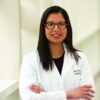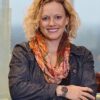Building team camaraderie
Ms. Cardin says that the need for APPs has led to an evolving integration between physicians and APPs. The growing teamwork and bonding between colleagues have been some of the most rewarding aspects of the pandemic for Dr. Gadalla. “We rely even more on each other and there isn’t really a line of, ‘I’m a physician versus an NP or PA or nurse.’ We’re all working together with the same goal,” she said.
Ms. McGrath said she has been learning what it means to lead a team during a challenging time. It has been gratifying for her to watch mentors get down to the bare bones of patient care and see everyone unify, putting aside roles and titles and coming together to care for their patients in innovative ways.
“This pandemic has really opened up a lot of doors for us because up until now, we were used almost like scribes for physicians,” Dr. Drane said. She has seen even the most resistant hospital systems beginning to rely on APPs as the pandemic has progressed. “They have become pleasantly surprised at what an APP can do.”
Work challenges
Obviously, challenges abound. Dr. Gadalla listed hers as visiting restrictions that invariably lead to slower patient visits thanks to obligatory phone calls, constantly fluctuating patient censuses, sporadic elective surgeries, watching colleagues become furloughed, and trying to balance external perceptions with what’s actually happening in the hospital.
Overall, though, “There have been a lot more rewards than barriers,” added Dr. Drane.
One of the biggest obstacles for health care workers navigating a pandemic is balancing work and home life, not to mention having time to unwind while working long hours. “Finding time for my family has been very limited. My kids feel really neglected,” said Dr. Gadalla. Some days, she gets up extra early to exercise to help clear her head, but other times she’s just too exhausted to even move.
Dr. Drane agreed that the work can get overwhelming. “We’re changing the way we practice almost every week, which can make you doubt yourself as an educator, as a practitioner. You constantly feel like you’re not sure what you’re doing, and people trust you to heal them,” she said. “Today is my first day off in 24 days. I only got it off because I said I needed a moment.”
Ms. Sheffer’s crazy days were at the beginning of the pandemic when she had to self-quarantine from her family and was working nonstop. “I would come home and sleep and work and wake up in the middle of the night and double check and triple check and go back to sleep and work, and that consumed me for several months,” she said.
The biggest challenge for Ms. Sheffer has been coping with public fear. “No matter how logical our medical approach has been, I think the constant feeling of the public threat of COVID has had this insidious effect on how patients approach their health,” she said. “We’re spending a lot more time shaping our approach to best address their fears first and not to politicize COVID so we can actually deal with the health issue at hand.”
© Frontline Medical Communications 2018-2021. Reprinted with permission, all rights reserved.


